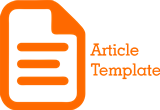Melacak Pengaruh Budaya Belajar terhadap Ketangkasan Belajar: Peranan Keterlekatan Kerja sebagai Mediator
Abstract
Keywords
Full Text:
PDFReferences
Arifin, F., Troena, E., & Djumahir, M. (2014). Organizational culture, transformational leadership, work engagement and teacher's performance: Test of a model. International Journal of Education and Research., 2(1), 1-14.
Bailey, C., Madden, A., Alfes, K., & Fletcher, L. (2015). The meaning, antecedents and outcomes of employee engagement: A narrative synthesis. International Journal of Management Reviews, 0, 1-23.
Bakker, A. B., & Leiter, M. P. (2010). Work engagement - A handbook of essential theory and research. East Sussex: Psychology Press.
Bakker, A. B., Schaufeli, W. B., Leiter, M. P., & Taris, T. W. (2008). Work engagement: An emerging concept in occupational health psychology, 22(3), 187-200.
Brunetto, Y., Xerri, M., & Nelson, S. (2014). Building a proactive, engagement culture in asset management organizations. Journal of Management in Engineering, 30(4), 1-27.
Chhetri, S. B. (2017). Antecedents and consequences of job engagement empirical study of bank employees. Business Perspectives and Research, 5(2), 1-13.
De Meuse, K. P., Dai, G., Eichinger, R. W., Page, R. C., Clark, L. P., & Zewdie, S. (2010). The development and validation of a self assessment of learning agility, (January), 57.
Derue, D. S., Ashford, S. J., & Myers, C. G. (2012). Learning agility: In search of conceptual clarity and theoretical grounding. Industrial and Organizational Psychology, 5(3), 258-279.
Gravett, L. S., & Caldwell, S. A. (2016). Learning agility - The Impact on recruitment and retention. Cincinnati Ohio: Palgrave MacMillan.
Hair, J. F. J., Hult, G. T. M., Ringle, C., & Sarstedt, M. (2014). A primer on partial least squares structural equation modeling (PLS-SEM). Long Range Planning.
Hitka, M., Vetráková, M., Balážová, Ž., & Danihelová, Z. (2015). Corporate culture as a tool for competitiveness improvement. Procedia Economics and Finance, 34, 27-34.
Huhtala, M., Tolvanen, A., Mauno, S., & Feldt, T. (2015). The associations between ethical organizational culture, burnout, and engagement: A multilevel study. Journal of Business and Psychology, 30(2), 399-414.
Imperatori, B. (2017). Engagement and disengagement: Drivers and organizational practices to sustain employee passion and performance. Springer.
Juhdi, N., & Pa'wan, F. (2012). Examining characteristics of high potential employees from employees' perspective. In International Conference for Academic Disciplines (Vol. 5, pp. 175-186).
Kahn, W. A. (1990). Psychological conditions of personal engagement and disengagement at Work. Academy of Management Journal, 33(4), 692-724.
Karatepe, O., & Aga, M. (2016). The effects of organization mission fulfillment and perceived organizational support on job performance - the mediating role of work engagement. International Journal of Bank Marketing, 34(3).
Kim, C. M., Park, S. W., Cozart, J., & Lee, H. (2015). From motivation to engagement: The role of effort regulation of virtual high school students in mathematics courses. Educational Technology and Society, 18(4), 261-272.
Lee, J. H. J., & Ok, C. M. (2015). Drivers of work engagement: An examination of core self-evaluations and psychological climate among hotel employees. International Journal of Hospitality Management, 44, 84-98.
Lombardo, M. M., & Eichinger, R. W. (2000). High potentials as high learners. Human Resource Management, 39(4), 321-329.
Macey, W. H., & Schneider, B. (2008). The meaning of employee engagement. Industrial and Organizational Psychology, 1(January), 3-30.
Mack, O., Khare, A., Kramer, A., & Burgatz, T. (2016). Perspectives on a VUCA world. In Managing in a VUCA World (pp. 3-19).
Qadeer, F., Ahmed, A., Hameed, I., & Mahmood, S. (2016). Linking passion to organizational citizenship behavior and employee performance: The Mediating Role of Work Engagement. Pakistan Journal of Commerce and Social Sciences, 10(2), 316-334.
Rebelo, T., & Gomes, A. D. (2011). The OLC questionnaire: A measure to assess an organization cultural orientation toward learning. In Technology for Creativity and Innovation: Tools, Techniques and Applications (pp. 217-236).
Rebelo, T. M., & Gomes, A. D. (2011). Conditioning factors of an organizational learning culture. Journal of Workplace Learning, 23(3), 173-194.
Rigby, B. D., & Bilodeau, B. (2015). Management Tools & Trends 2015. Bain & Company
Robbins, S. P., & Judge, T. A. (2013). Essential of organizational behavior (12th ed.). Pearson.
Sadeli, J. (2012). The influence of leadership, talent management, organizational culture and organizational support on Employee Engagement. International Research Journal of Business Studies, 5(3).
Schaufeli, W. B. (2013). What is engagement? In Employee Engagement in Theory and Practice (pp. 1-37). London: Routledge.
Seppälä, P., Mauno, S., Feldt, T., Hakanen, J., Kinnunen, U., Tolvanen, A., & Schaufeli, W. (2009). The construct validity of the Utrecht Work Engagement Scale: Multisample and longitudinal evidence. Journal of Happiness Studies, 10(4), 459-481.
Simamora, B. H., & Jerry, M. (2013). Current and preferred organizational culture: A case study at Private University in Indonesia. International Business Management, 7(4), 353-358.
Wang, J. (2016). The antecedents of employee engagement: A comparative analysis between Finland and Asia. Aalto University - School of Business.
Wollard, K. K., & Shuck, B. (2011). Antecedents to employee engagement. Advances in Developing Human Resources, 13(4), 429-446.
Yadav, N. (2017). A conceptual model of learning agility and authentic leadership development : Moderating effects of learning goal orientation and organizational culture. Journal of Human Values, 23(1), 1-12.
DOI: http://dx.doi.org/10.37905/aksara.8.2.909-920.2022
Refbacks
- There are currently no refbacks.
Copyright (c) 2022 Aksara: Jurnal Ilmu Pendidikan Nonformal

This work is licensed under a Creative Commons Attribution-ShareAlike 4.0 International License.
Publisher:
Magister Pendidikan Nonformal Pascasarjana Universitas Negeri Gorontalo
Jl. Soedirman No. 06 Gorontalo 96128 e-mail: jurnalaksara@ung.ac.id
http://ejurnal.pps.ung.ac.id







